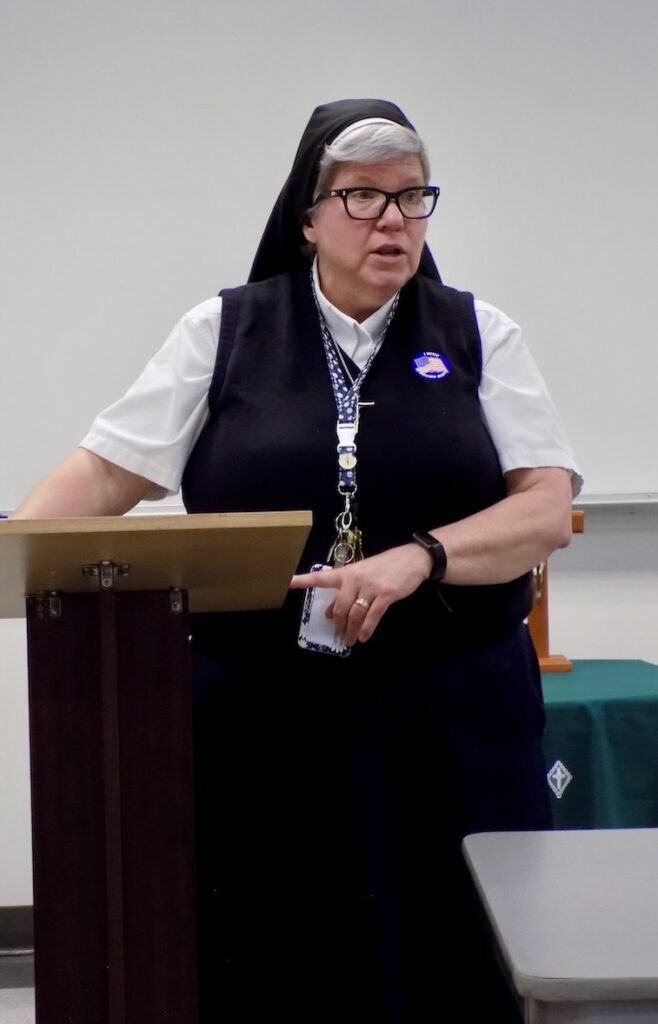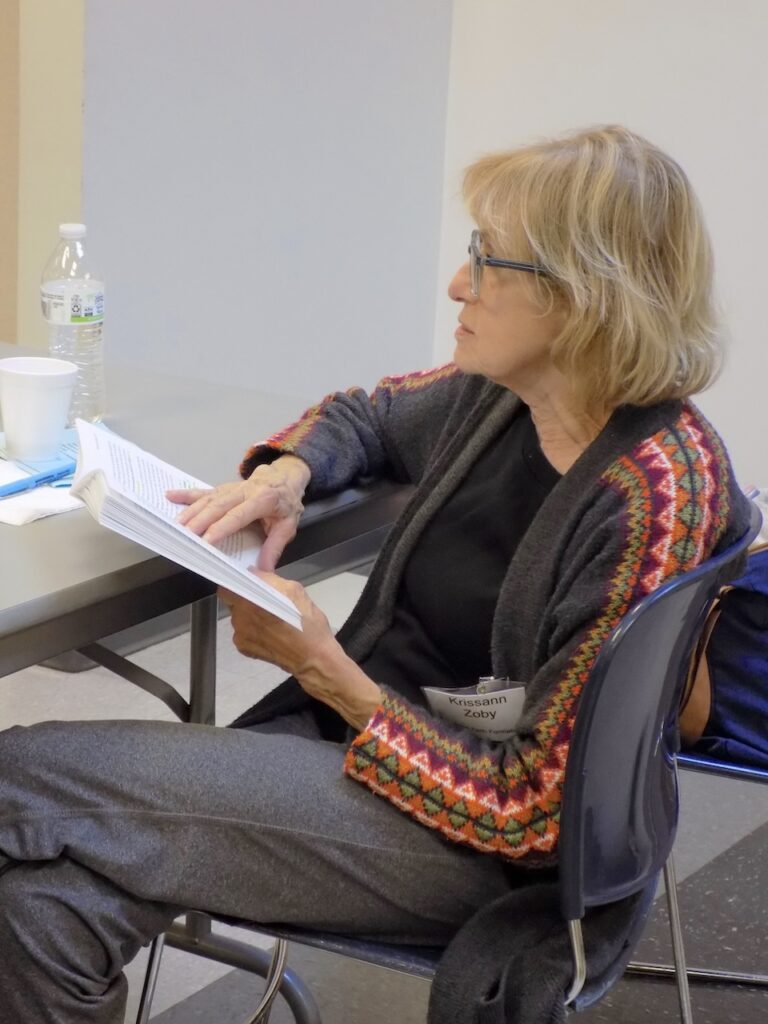“I have come to set the earth on fire,” Jesus exclaims in the Gospel of Luke, “and how I wish it were already blazing!” (Lk 12:49).
What if we had such a fire? Sister Emily Faubion of the Sisters, Servants of the Immaculate Heart of Mary, and director of religious education and adult formation at St. Gregory the Great, Virginia Beach, asked this question during her Wednesday evening book group.
“What if we exploded out of the church and headed down Virginia Beach Boulevard to share the Good News with the people that we met? Wouldn’t it be wonderful, if we just couldn’t help ourselves?” she asked.
For several weeks this fall, Sister Faubion challenged about 30 people, split into three groups, to reflect on their relationships with Christ in the Eucharist and to consider their callings.
Together, the small groups have been delving into a book titled, “For the Life of the World: Invited to Eucharistic Mission,” written by Bishop Andrew H. Cozzens, board chairman of the National Eucharistic Congress, Inc., and Tim Glemkowski, former CEO of the congress.
Sister Faubion said she was blessed to be able to go to the Eucharistic Congress in July, and “wanted to bring that spirit back to the parish. I wanted to figure out how we could encourage people to be Eucharistic missionaries here at St. Gregory.”
With thought-provoking questions at the end of each chapter, the book seemed perfect for group discussions, she said.
“Once you are an adult, it’s hard to find opportunities to learn,” said Thomas Petet, a parishioner of St. Gregory and member of the study group.
“The book is phenomenal, and Sister Emily has been amazing,” he said. “The more you pray and listen, the more you get the answers. The door is open. You just have to listen.”
The Eucharistic encounter
Sister Faubion began the Wednesday evening book group’s fifth meeting by plunging into the heart of the Eucharistic encounter.

“Here’s where the rubber meets the road,” she said. “Why does Christ make his Paschal Mystery present in the Eucharist?”
The study group turned toward a passage in their books citing the Catechism of the Catholic Church, 1085, which explains how the Paschal Mystery is unique: at once a moment in history and an event that participates in Christ’s divine eternity.
It transcends time and is made present in all times.
“So we can offer true worship,” said Ingrid McGowan, a parishioner of St. Matthew. “We are a part of the moment. We are there.”
It’s important to attend Mass with a sense of intentionality, she said.
“When we come to Mass, we are bringing ourselves, all of ourselves, and offering it, with Jesus, to the Father on the altar. We are called to true, active worship,” McGowan said.
“If people only knew that’s what happens, in that moment of consecration, our churches would be packed,” said Kimberlie Petrulis, a parishioner of St. Luke, Virginia Beach.
The Eucharistic life
“Catholicism is not a spectator sport,” Petet said. “We aren’t called to sit on the sidelines, but to be like Jesus. That’s a heavy challenge.”
The challenge is there, but so is our source of grace.
“Every reception of Jesus in the Eucharist changes us in some way,” Sister Faubion said.
We imagine too often that we must offer beautiful things to God, she said. We may feel that we aren’t good enough, that we are sinful, or that we don’t belong.
“But the reality is that we have to bring ourselves in all our sinfulness and all our weaknesses, so that [we] can be transformed,” Sister Faubion said.
The Eucharistic encounter invites us into a new life – a life in which we learn to offer our sins and sufferings for others. To forgive. To love.
“It’s easy to do that with people we get along with, but it’s hard to do with people who are annoying,” Petrulis, said, as the group burst into understanding laughter.
“There’s that challenge, of course, with people who rub you the wrong way,” Sister Faubion agreed. “But we need to pray especially for those people. And who does that change?”
“Me,” Petrulis said, simply.
“Yes. It transforms your heart. It transforms you,” said Sister Faubion.
That transformation, in turn, allows us to transform those we come into contact with each day, she said.
“And then we go back to the font, so we can receive Jesus again, so we can be changed again, so that we can go out and bring Jesus to the world again, and change it more,” Sister Faubion said.
“I think that’s so beautiful,” she said.
Finding your mission

Many of the participants said they enrolled in the book group because they had attended the National Eucharistic Congress in Indianapolis and were inspired to find ways they might share its message back home.
“There is so much more to being Catholic than just going to Mass,” Petrulis said. “You are looking for your mission, the way to grow closer to God. Every person has a different talent in that way. We are supposed to follow that call.”
The first step to finding your mission is to be open to the possibilities, the group decided.
“Trust in the Holy Spirit. It frees you,” McGowan said. “You can always say, ‘I’m not responsible for this,’” she said, as the others broke into laughter.
Maureen DeGrush, of St. Gregory, related how the Holy Spirit wrought such a change in her when she was asked to speak at a retreat.
“I wasn’t that type of person,” she said. “I was shaking in my shoes to stand in front of a group of people I didn’t know and give that speech. I prayed, and I said, ‘Ok, God, here’s the pen, here’s the paper, tell me what to write.’”
“So I did it, and now I’m on the team,” she said. “And the next year I had to give two speeches.”
At the end of the meeting, Ozzie Ozkosar, a parishioner of St. Gregory, told a story of how he and his wife visited the Seven Churches of Asia years ago. When they visited Cappadocia, they were amazed and inspired by the underground city in which Christians once took refuge from the Romans.
“They lived together as a Church,” he said. “They helped each other, they loved each other, they worshiped with each other. They took care of people in the community. They lived by example,” he said. “And they did not give up.”
We, too, are called to be living examples to those we encounter of what it means to be Catholic, Sister Faubion said.
“We each have a part to play, and you are God’s plan A,” she said. “He has already planned for us to reach certain people, eternal souls for whom he is desperately searching.”
“God has chosen you to be the balm for some wounds,” she said. “To bring those who you meet home.”

